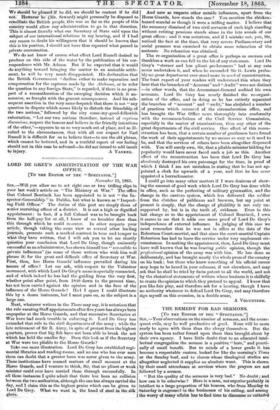THE REMEDY FOR BAD SERMONS.
[To THE EDITOR OF THE "SPECTATOR."] Sat,—Your observations on the number of sermons, and the conse- quent evils, may be well productive of good. None will be more ready to agree with them than the clergy themselves. But the system has been rather forced upon them than brought about by their own agency. I have little doubt that to an educated intel- lectual congregation the sermon is a positive "bore," and practi- cally of small benefit. But to minds of a lower grade it has become a respectable custom, looked for like the morning's Times or the Sunday beef, and to' classes whose theological studies are altogether neglected it supplies an absolute want. This is shown by their small attendance at services where the prayers are not followed by a sermon.
" But the quality of the sermons is very bad." No doubt ; and how can it be otherwise ? Here is a man, not superior probably in intellect to a large proportion of his hearers, who from Monday to Saturday is engrossed in the businesses of his calling, and among the worry of many affairs has to find time to discourse ex cathedra to men as able and as well-informed as himself, and this is to go on week after week, twice very often upon the Sunday, with perhaps a month or two of holiday in the year. Where is he to find time for that continued application and study, for that con- secutive and logical thought which may qualify a man to speak with the freshness of knowledge, with a power that springs from a mastery of his subject? None can be more conscious than the preacher himself very often is of the imperfect use he makes of that singular opportunity which society puts in his reach. " To be called into a huge sphere and not to be seen to move in it, are the holes where eyes should be which pitifully disaster the cheeks." Never were so many sermons as nowadays, by so many preachers, in so many places, and unless men are very different now from what men have mostly been, the greater part of these cannot but be poor. Chrysostom or Bernard might go on preaching day after day. But even they had their seasons of " retreat ; " an old canon required bishops to retire every year for one month from all public affairs. The injunctions issued in Elizabeth's time ordered one sermon to be preached in each quarter of the year, and it was the saying of a tutor, well known at Oxford in his day, that no man ought to write more than one sermon in a month.
It is unreasonable, then, to expect ordinary men to do what the great ones can hardly accomplish, and if sermons are too many now and too bad, in what direction shall we look for a remedy? In the establishment of an order of Preachers, men especially selected and trained for this work, and employed in it alone. Such men, if wisely chosen and carefully instructed, would do more to raise the tone of sermons and to discredit the trash of hasty compilations than all the anathemas of critics, however richly deserved. And it would follow from their success that " the sermon" would assume its true position, and become again a service of itself, instead of being a necessary adjunct of all our devotional services.—I am, Sir, obediently yours, A PREBENDARY AND RURAL DEAN.































 Previous page
Previous page